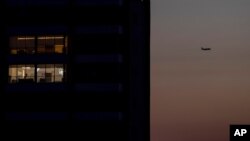Lebanon's caretaker Finance Minister Ghazi Wazni said Friday that the country would run out of money to fund basic imports by the end of May.
Wazni also said that delays in launching a plan to reduce the subsidies paid to hundreds of thousands of poor people were costing the country $500 million a month.
"The government must speed this up. The cost of wasting time is very high. With every delay, it becomes higher," Wazni said.
Wazni’s announcement came after Lebanon's Parliament on Monday approved a $200 million loan to pay for fuel for the country's electricity company. The move was prompted by a warning from the energy ministry that money had run out for electricity generation beyond the end of the month.
One of the country's four main electricity producers, the Zahrani power plant, shut down Monday after it ran out of fuel. A second plant, Deir 'Ammar, shut down Thursday.
Blackouts expected to grow
The country is now expected to face longer blackouts following the three-day Easter weekend lockdown to avoid another surge in COVID-19 cases.
In mid-March, caretaker Prime Minister Hassan Diab announced that fuel for electricity generation would run out by the end of March. He also said at the time that efforts were being made to “secure new credit lines to cover needs.”
As Lebanon's economic crisis worsens, the country's central bank has asked the caretaker Cabinet to decide how to gradually lift subsidies to ration out what remains of the foreign reserves.
Subsidies set to be cut
Wazni has said the subsidy plan will roughly halve the $6 billion in annual spending on subsidies by scaling back a list of subsidized foods from 300 to 100 goods, reducing fuel and medicine subsidies, and introducing a ration card for 800,000 poor families.
The plan will have to go through a series of approval processes before going into effect.
"Rationing and restricting subsidies is overdue, but it should have been part of a comprehensive reform program negotiated with the IMF [International Monetary Fund], for which Lebanon could have secured financial assistance," said Firas Maksad, the director of strategic outreach at the Middle East Institute.
"The manner in which this is being done will instead fuel social unrest without enhancing donor confidence or providing the Lebanese with a light at the end of this very dark tunnel," Maksad said.
The country's current economic meltdown is its biggest crisis since the 1975-1990 civil war, which killed an estimated 120,000 civilians.
Lira drops, prices soar
The country's currency, the lira, has lost most of its value since 2019, making prices soar.
Politicians in Lebanon remain unable to agree on a rescue plan or new government since the outgoing administration quit in August, following the massive explosion at Beirut's port.
To Michael Page, deputy Middle East director at Human Rights Watch, the blame for the financial crisis rests with those in power.
"While governments around the world are scrambling to provide additional support for people still being pummeled by this ongoing pandemic, the Lebanese government is refusing to take the reforms necessary to stabilize the economy and instead seeking to make the most vulnerable people in Lebanon pay the price for political leaders' incompetence and corruption," Page said.




